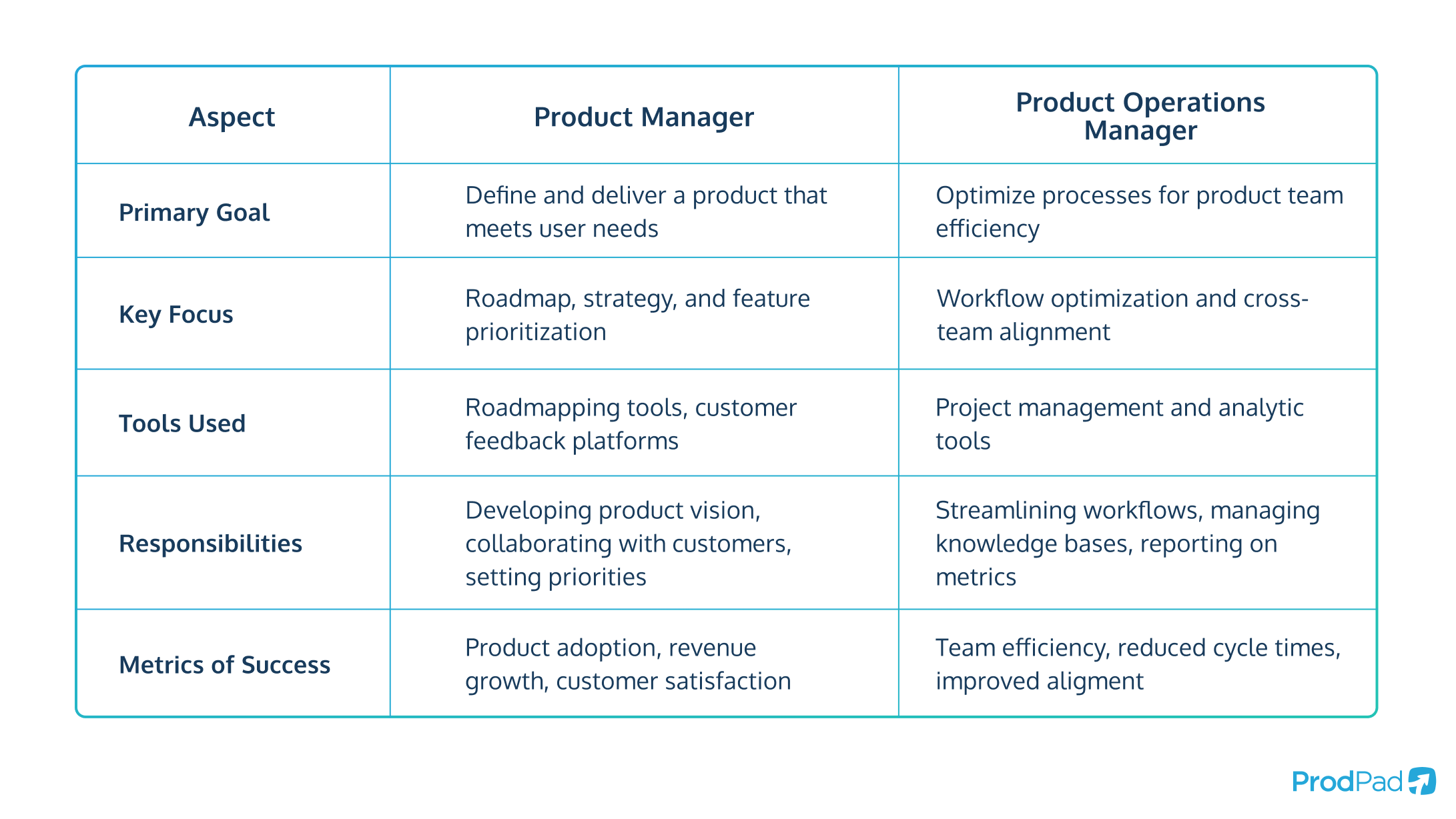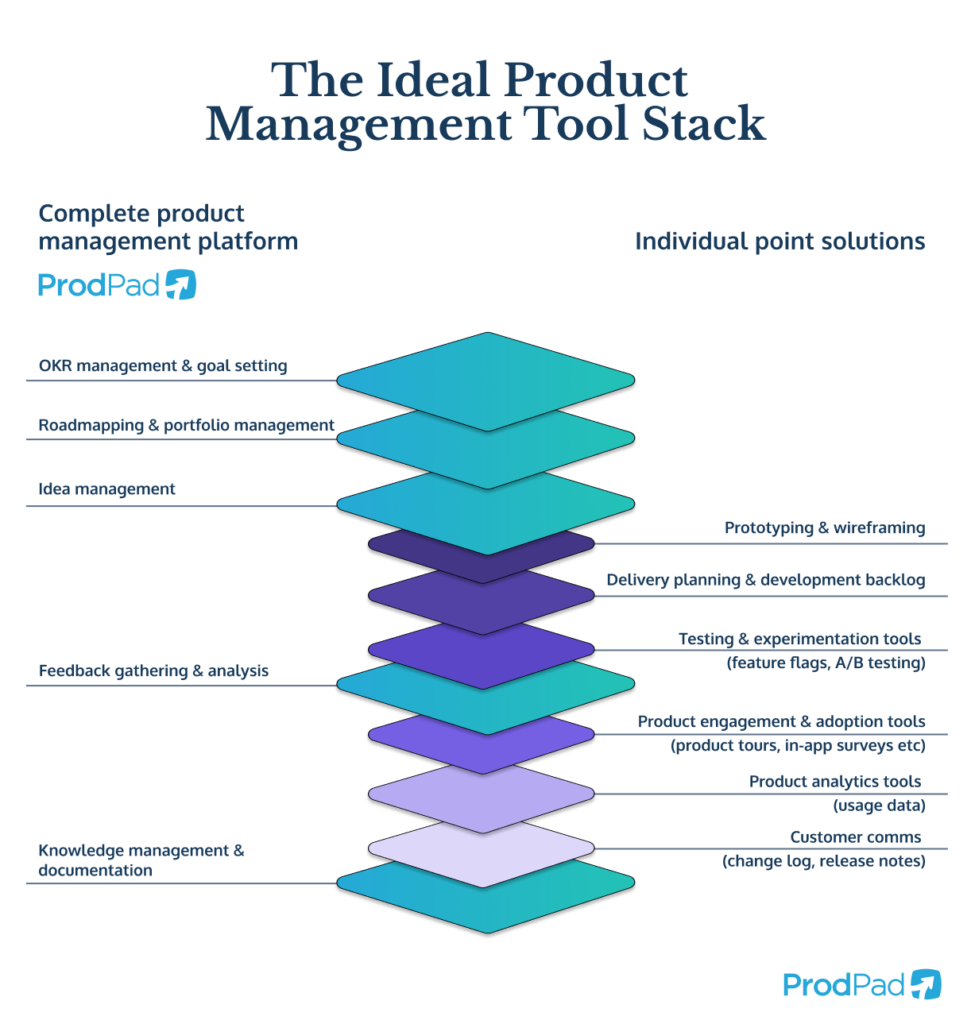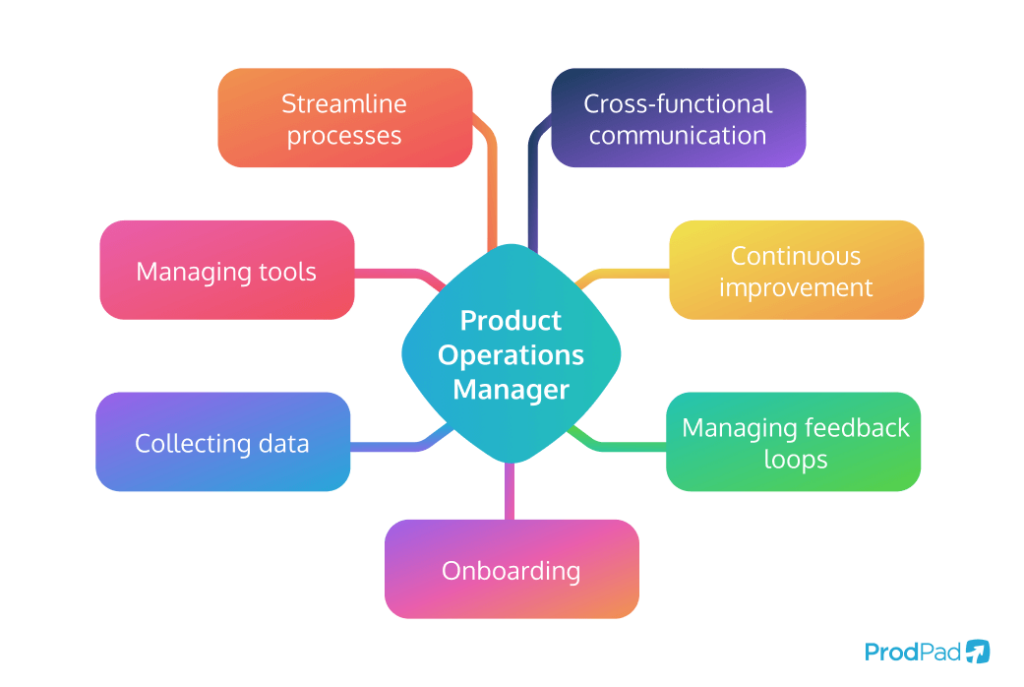Product Operations Manager
What is a Product Operations Manager?
A Product Operations Manager supports the wider Product Management function by handling the practical, operational work of the product process, taking it off the plate of the PM so they can focus on crucial product-orientated tasks. A Product Operations Manager takes ownership of ‘bitty’ administrative tasks while introducing ways to improve collaboration and streamline processes. This makes the entire Product Team more efficient and facilitates smarter decision-making.
A Product Operations Manager is becoming an increasingly sought-after role for scaling Product Teams. As Product Teams grow, Product Managers often find themselves bogged down by operational hurdles such as choosing tools, organizing workflows, and gathering data. These responsibilities, while critical, pull PMs away from their primary focus: building and improving products.
Enter the Product Operations Manager: a dedicated problem-solver who steps in to manage these complexities.
By taking on this operational load, Product Operations Managers empower Product Teams to work smarter, make better decisions, and achieve more throughout the entire Product Management lifecycle.
Although a Product Operations Manager holds no influence over product development, their work helps improve product discovery, data analysis, and facilitates data-driven Product Management. The role helps Product Teams build better products.
Product Manager vs Product Operations Manager
Think of Product Managers and Product Operations Managers as two gears in a finely tuned machine. They both need to ‘click’ to get things moving properly.
While Product Managers set the direction – crafting the product vision, defining priorities, and steering execution – Product Operations Managers ensure the engine runs smoothly. These roles work in a partnership alongside each other, where one role clears the path for the other to thrive.
If Product Managers are racecar drivers, Product Operations Managers are those clearing the track of any debris or oil spills so that they can have a smooth race. Product Managers lead customer discovery, craft strategies, and set the product roadmap. Meanwhile, Product Operations Managers ensure those strategies can be executed effectively by overseeing and selecting the right tools, managing cross-functional coordination, maintaining customer feedback loops, and providing actionable, clean data.
Without a Product Operations Manager, PMs risk being pulled into time-intensive operational tasks, leaving less room for strategic work. With a Product Operations Manager in place, Product Managers can concentrate on high-impact activities like market analysis, prioritization, and delivering meaningful customer outcomes.

What does a Product Operations Manager do?
The main goal of a Product Operations Manager is to streamline and optimize the operational processes in the Product Management function. Now, the way they do this can vary depending on what each organization needs.
At the end of the day, a Product Operations Manager is designed to make the life of a Product Manager easier and allow them to do better work. They eliminate the distractions. Here are some of the common responsibilities a Product Operations Manager will handle on a day-to-day basis:
Streamline processes
One of the main responsibilities of a Product Operations Manager is identifying and optimizing processes within the Product Team structure. This could involve standardizing workflows for sprint planning, backlog grooming, or roadmap updates. If there’s a bottleneck or a blocker, a Product Operations Manager should be on hand to work out a solution that helps teams deliver value.
Managing tools and systems
The most effective Product Teams have a sophisticated stack of tools empowering their work and supporting their processes. That Product Management tool stack usually looks something like this:

Evaluating, testing, and implementing the best Product Management software is a serious, and important job. A Product Operations Manager takes ownership of this process, assessing these tools, running procurement, rolling out onboarding and training across the team, and owning the ongoing adoption and relationship with the vendor. All of this is done with an understanding of the Product Team’s needs and the objective of achieving maximum efficiency.
Collecting and analyzing metrics
To drive data-informed decisions, a Product Operations Manager is tasked with collecting and analyzing metrics that reveal team performance, process efficiency, and customer feedback trends. They then transform this raw data into actionable insights, enabling Product Managers to refine strategies and improve outcomes.
Facilitating cross-functional communication
Collaboration across teams is critical in product development, especially in a product-led company. Product Operations Managers act as the glue, ensuring seamless communication between Product, Engineering, Design, and other key stakeholders. They establish clear communication channels, schedule alignment meetings, and make sure that updates are shared consistently. This prevents anyone from working within a silo.
Driving continuous improvement
Product Operations Managers are always on the lookout for opportunities to enhance team performance. Whether it’s identifying inefficiencies in workflows or introducing best practices, they proactively suggest and implement changes to ensure the team operates at its best.
Managing Feedback Loops
Customer and stakeholder feedback is vital for product success. A Product Operations Manager ensures that this feedback is collected, organized, and routed to the right people within the Product Team. Without this, feedback can be messy and hard to decipher. By managing these loops, they help teams prioritize improvements, easily work out the next steps, and maintain alignment with customer needs.
Onboarding new team members
A smooth onboarding process means new hires can hit the ground running. Product Operations Managers take responsibility for creating and executing onboarding plans that familiarize new team members with tools, processes, and expectations, accelerating their integration into the team.

Does this list include things you’re consistently doing as a Product Manager?
If so, and if your company can cover it, it might be time to suggest that a Product Operations Manager is brought in to cut you some slack and help you focus on core Product Management work.
Why is a Product Operations Manager important?
Simply put, without someone focused on operational efficiency, there’s a chance you end up creating chaos. Teams become siloed, processes become inconsistent, and decisions take longer. A Product Operations Manager steps in to smooth out these growing pains and ensure the organization can scale without losing clarity.
As teams grow, the cracks in your operational foundation can become glaring. Without someone to align workflows, streamline tools, and ensure consistency across teams, Product Managers (PMs) can find themselves buried in low-value operational tasks. The stage setting before the show can start.
By introducing a Product Operations Manager to take responsibility for these tasks, you create bandwidth for your PMs to focus on what is most important in that role: delivering value to customers.
But bringing in a Product Operations Manager isn’t about t offloading the work PMs don’t want to do. Don’t think that a Product Operations Manager does all your donkey work. They are with you to supercharge the entire product function, adding some spark to how things are done. Here are the key benefits they bring to the table:
- Efficiency gains: With a Product Operations Manager handling administrative and operational tasks, Product Managers can regain time to dedicate to strategically impactful work.
- Better insights: Product Operations Managers are your data collectors. They collect triage metrics, customer feedback, and more to give you freshly backed insights that can help a Product Team improve their product.
- Consistency across teams: A Product Operations Manager ensures standardized processes are followed so that every team operates in the same way to foster efficiency and professionalism.
- Improved communication: A Product Operations Manager acts as a bridge between Product, Engineering, and other departments, keeping everyone aligned and ensuring critical information flows seamlessly across teams.
When will you need a Product Operations Manager?
A Product Operations Manager isn’t going to work for all companies. In short, Product Operations, and therefore a Product Operations Manager, is something that you bring in when you’re starting to scale, and when your pre-existing Product Team is starting to show signs of struggle.
Say you’re a team with one Product Manager. They’re spending 10% of their time on Product Ops work, but the rest blasting through impactful Product Management tasks. There’s no point bringing in a Product Operations Manager or team, as there’s not a lot to be done to keep them busy.
But say you have an amazing few years, and grow to a team of 10 Product Managers who are spending 15% of their time on Product Ops. Now’s when you can start to ask the question and bring in a Product Operations Manager, as they’ll be able to pick up the slack of all these PMs and help improve your overall focus.
If your PMs are spending more time coordinating meetings, managing tools, or chasing down metrics than driving product strategy, it’s time for help.
You’ll also find that as teams get bigger, they start to work in their little bubbles, nearly oblivious to what’s happening in this other area of your organization. This can lead to efficiency taking a hit, and a Product Operations Manager is necessary to come in and realign your teams.
Ultimately, if your Product Team is spending more time managing the process than delivering outcomes, it’s a strong indicator that a Product Operations Manager is not just helpful: it’s essential.
How does a Product Operations Manager fit into a Product Team structure?
A Product Operations Manager is far from one of the first hires your organization makes, so you’re going to have an established team and hierarchy by the time you call on one. So where do they slot in?
Well, a Product Operations Manager is a supporting role that usually comes in alongside the Product Manager to complement them, not oversee. After all, Product Ops was once a hat a PM wore before it got too heavy, so it makes sense for it to be an adjacent role.
A Product Operations Manager will typically report to the same Product Leader as their adjacent PM, but due to the nature of the role as being a ‘bridge’ between departments, Product Ops Managers will be heavily involved with loads of other stakeholders and departments.
How do you become a Product Operations Manager?
Becoming a Product Operations Manager is a path that combines a deep understanding of Product Management with a passion for optimizing processes to help teams succeed. There are multiple ways into this role, but a common route is for a single existing Product Manager to step up to the plate and morph into this Product Operations focused role.
You’ll find that when Product Ops work needs to be done, a more organized or process-oriented PM will take it on. These people naturally become good candidates for a dedicated Product Operations Manager role. Those who enjoy fine-tuning processes and tools to improve product development will have a particularly good time in this position.
If you want to become a Product Operations Manager, a background in Business Operations or Data Analysis will also be highly relevant. If you’ve worked in roles that involve optimizing business processes, analyzing data for actionable insights, or streamlining workflows, you’ll bring valuable problem-solving skills to the table. Data Analysts, for example, can leverage their ability to interpret data to optimize operational decisions in Product Teams, ensuring that metrics drive efficient workflows.
You don’t particularly need formal qualifications to enter this role, but certain credentials can set you apart. A degree in business, management, or a technical field provides a solid foundation for understanding business operations, team dynamics, and product development.
What skills do you need to become a Product Operations Manager?
To thrive as a Product Operations Manager, you’ll need a diverse skill set that blends technical expertise, analytical thinking, and strong interpersonal communication.
The role is both strategic and tactical, requiring you to optimize processes, manage tools, and ensure seamless cross-functional collaboration. Here’s a deeper dive into the essential skills that will set you up to smash this role:
- Process optimization: Being able to spot inefficiencies in workflows from a mile away and develop streamlined processes is critical. You’ll need to be a process guru; skilled at identifying bottlenecks, improving team collaboration, and standardizing operations to boost productivity.
- Tool proficiency: Familiarity with Product Roadmap tools and collaboration platforms is key to managing the technical aspects of the role. You’ll also need experience with data analytics tools to track metrics and gain insights into team performance.
- Data analysis: A strong grasp of data analysis is essential for turning raw data into actionable insights. This means tracking Product Management KPIs, analyzing trends, and using that data to improve team performance and decision-making.
- Communication: As the bridge between various teams your communication skills need to be top-notch. You’ll be responsible for aligning stakeholders, writing clear reports, presenting findings, and ensuring everyone is on the same page.
- Problem-solving: Challenges are bound to arise in any product environment, and your ability to solve problems quickly and effectively will be one of your greatest assets.
- Project management: Product Operations Managers often juggle multiple projects at once. From coordinating cross-functional teams to ensuring deadlines are met, strong project management skills are a must.
- Empathy and collaboration: Understanding the needs of different teams and fostering collaboration is super important in this role. You’ll be working with a range of stakeholders, each with different goals and priorities. The ability to empathize, listen, and mediate between teams will be pretty handy if you want to maintain harmony.
- Attention to detail: Ensuring that every task is executed to a high standard requires a keen eye for detail. Whether you’re documenting processes, reviewing project timelines, or analyzing data, your attention to the finer points will ensure that operations run without a hitch and nothing slips through the cracks.
How much does a Product Operations Manager earn?
According to Talent.com, a Product Operations Manager can expect to earn an average salary of around $138,00 on average in the United States. This competitive compensation highlights the growing demand for the role and its increasing importance in helping businesses scale effectively. As organizations prioritize efficiency and streamlined operations, the value of a skilled Product Operations Manager has never been clearer.
At the time of writing, these salaries are comparable to those of Product Managers – again according to Talent.com – and in some cases, they may even edge higher. This shows the equal importance of both roles within the product development ecosystem, each playing a unique yet complementary part in driving product success.
Of course, take that salary average with a pinch of salt. Individual pay varies based on things like experience, company size, and job location. Salaries in major tech hubs, for instance, are often significantly higher than in other regions. Still, this data reflects a thriving career path.
Product Operations is emerging as a distinct and essential discipline, evolving from traditional Product Manager responsibilities and carving out its own niche in modern organizations. As businesses continue to scale and mature, expect this role to become even more prevalent and indispensable.
Managing your operations
A Product Operations Manager is the hero of scaling Product Teams. By managing tools, streamlining processes, and enhancing cross-functional collaboration, they empower Product Managers to focus on delivering customer value.
As organizations grow, the cracks in operational efficiency can widen, leading to inefficiencies and burnout. A Product Operations Manager bridges those gaps, ensuring that the entire product function runs like a well-oiled machine. Whether it’s implementing consistent workflows, collecting actionable insights, or fostering seamless communication, their work adds value at every stage of the product lifecycle.
So, if your Product Team is starting to feel stretched, it might be time to bring in a Product Operations Manager. They’re not just there to lighten the load, they’re there to elevate the entire product function, helping your team scale with confidence and clarity.
Looking to set your Product Team up for success. Check out ProdPad to power seamless collaboration, smarter workflows, and a roadmap for delivering exceptional results. Our tool is for everyone in the Product Team and beyond – Product Managers, Product Operations Managers, Engineers, and more. Check out what ProdPad can do today.
Try ProdPad for free today.